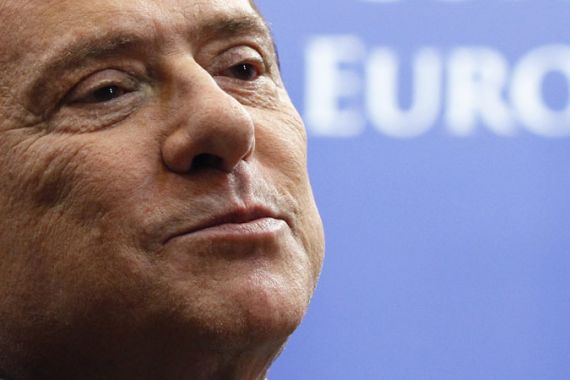Italy’s borrowing costs reach euro-era highs
Italian 10-year bond yields have hit a new euro-era high of 6.67 per cent, on fears over mounting political uncertainty.

 |
| Italy, the eurozone’s third-largest economy, has debts worth 120 per cent of national income [AFP] |
Italy has come under fresh market pressure to deal with its mountain of debts as the country’s cost of borrowing jumped to a euro-era high.
The yield on Italy’s 10-year bonds jumped another 0.33 percentage point on Monday to 6.67 per cent, its highest level since the euro was established in 1999.
Keep reading
list of 4 itemsA flash flood and a quiet sale highlight India’s Sikkim’s hydro problems
Why is Germany maintaining economic ties with China?
Behind India’s Manipur conflict: A tale of drugs, armed groups and politics
|
“Greece has pulled back from the abyss but it is still very much wobbling on the edge and what we are seeing now is Italy fast approaching Greece in terms of concerns“ – Louise Cooper, BGC financial analyst |
Italy, which is the eurozone’s third-largest economy and has debts worth 120 per cent of national income, is increasingly at the forefront of investor concerns over Europe’s debt crisis.
In light of the rising pressures on the country, the government of Silvio Berlusconi is looking increasingly shaky and the possibility of early elections is growing.
Berlusconi is insisting that his coalition still commands enough support in parliament to enact austerity measures.
Louise Cooper, a senior financial analyst at the BGC Partners group in London, told Al Jazeera “Berlusconi faces a budget vote on Tuesday which may not go his way, leaving investors worried and as a result causing market volatility.
“Greece has pulled back from the abyss but the country is still very much wobbling on the edge, and what we are seeing now is Italy fast approaching Greece in terms of concerns.
“If Greece does fall into the abyss, default in a messy and chaotic manner, that’s going to have quite big implications for the European economy which then will have implications for everybody around the world,” she said.
2012 ‘terrifying year’
The leader of Italy’s largest labour confederation is predicting 2012 will be a “terrifying” year for the economy even if
beleaguered Berlusconi leaves power soon.
Susanna Camusso, leader of Italy’s CGIL union, in an interview with the Associated Press news agency on Monday, also slammed Berlusconi’s anti-crisis plan as containing virtually nothing to spark economic growth.
Camusso insists what is urgently needed is tax reform. She contends that widespread tax evasion puts an unfair share of the burden on workers with paychecks.
Employers also bemoan high payroll taxes. One anti-crisis measure would make it easier to fire workers, but Camusso counters that ailing companies have been laying off workers for the past three years anyway.
The “easy-firing” measure has spurred union leaders to overcome recent divisions over strategy.